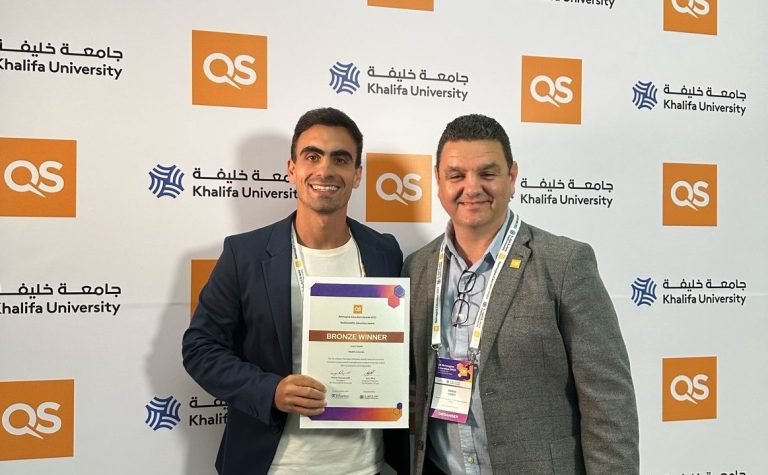Dubai – Khalifa University in Abu Dhabi hosted the ceremony of the QS Reimagine Education Awards this year, where Brazilian Smart Forests project won bronze out of the 1,200 entries submitted in the Sustainability Education category. The global competition is one of the world’s top education awards.
The two-year-old project is organized by the Facens University Center in partnership with Pará State University Center (CESUPA). Vitor Belota, head of Sustainability and Innovative Education of Splice Group – a multisectoral group that has Facens as its educational arm – and coordinator of the Smart Forests, received the award on behalf of the college and the students, celebrating the international recognition (pictured, Vitor Belota, L, receives the award from the hands of Barak Cerff, vice chair of QS Reimagine Education Awards).
In an interview with ANBA, Belota spoke about the project that aims to foster innovation and entrepreneurship in forest communities and engages university students from across Brazil who develop solutions for real challenges faced by these communities.
Belota explained that all the project’s student-devised solutions need to be open technologies that are easy replicate or scale. “Our focus here is to develop innovation, and the means we have to scale it up is seeking funding and promoting these ideas to institutions that already work in these regions and topics so that they can help scale the solutions devised,” he said.
In 2022 the project tackled the challenge of the drinking water access in river community Ilha do Combú, Pará. “Despite being in one of the world’s largest watersheds, the riparian doesn’t have access to drinking water, as the river water is not fit for consumption, due to the high traffic of vessels that pollute the water and the high concentration of iron. The students devised three solutions that have been implemented and have benefited the community,” said Belota.
This year the Smart Forests was focused on the challenges of biodiversity in the community. Belota stressed some projects from 2023. Six projects were implemented overall, including three in the Amazon Forest – in Cotijuba, Pará – and three in Mata Atlântica – in Tapiraí, São Paulo.
The winning team of the community Tapiraí in the Mata Atlântica implemented a water collection idea made of gutters for small farmers. The rainwater then drained down to water tanks through a solar power system connected to a smart irrigation system.
“The farmers themselves can program this irrigation and don’t have to waste the little time they have to work on the farms as they can program the irrigation to occur automatically throughout the day, which greatly maximizes the output of these micro and small farmers,” he explained.
Another project, this one in Ilha de Cotijuba, Pará, was carried out in partnership with the Belém Island’s Movement (MIB), an association of women entrepreneurs who grow foods sustainably and aims to bring about social development.
“It’s very hard for them as they need men to harvest forest fruit like açaí. The traditional harvest method is the so-caled peconha, but young men are less and less interested in this job, so there’re less men to do this. Women don’t traditionally do it, and many of them ate over 40, 50, so they can’t climb an açaí tree,” explained Belota.
He said that despite some romanticize the traditional harvest method, many communities would like more practical tools to harvest the fruit. “So this team devised a mechanism that is made of an aluminum rod with a series of modules that can be fit together to operate as an extension of the rod. It attaches to the tree and can cut the açaí bunch, the tucumã bunch, the coconut, and brings down the fruit using a claw mechanism, like an elevator. It’s a super interesting, super innovative idea, and we’re seeking support for replicating this technology in 2024,” he said.
Belota mentioned yet another project implemented in Tapiraí that transforms the ginger the community grows in an agro forestry model. “Transforming raw ginger into powder adds shelf life and value, thus increasing the income of these communities,” he said.
In conclusion, the project coordinator spoke of another idea implemented in the Amazon, to transform the coconuts that were previously treated like garbage into extra virgin coconut oil. “They grow and sell a lot of coconut in these islands of Belém. These coconuts were a waste, and the team devised a pressing machine that can transform them into cold-pressed raw extra virgin coconut oil that the women in the association can sell for a high-value added price and generate income,” he said.
The award received on Tuesday (12) in Abut Dhabi, Belota says, is a relevant recognition. “It is amazing. It’s a very important recognition of our work,” he said.
Selection process
Approximately 200 students from across Brazil submitted to the Smart Forests project in 2022 and 2023. Following an intense training and hackathons, the selected ideas received a seed capital to be implemented in the communities.
“Students that sometimes have never left their own towns, never traveled by plane, have the chance to meet two of Brazil’s largest biological heritages and implement projects that will contribute to conservating the biodiversity and improving the life quality of these communities,” said Belota.
For three months following the implementation, the impacts of these projects on communities are measure, then the most impacting idea is awarded, thus providing awareness and recognition, as well as a BRL 5,000 (USD 1,000) prize. “It is a symbolic prize, as the experience of the project is worth much more than that,” he said.
Learn more about the project:
Translated by Guilherme Miranda




